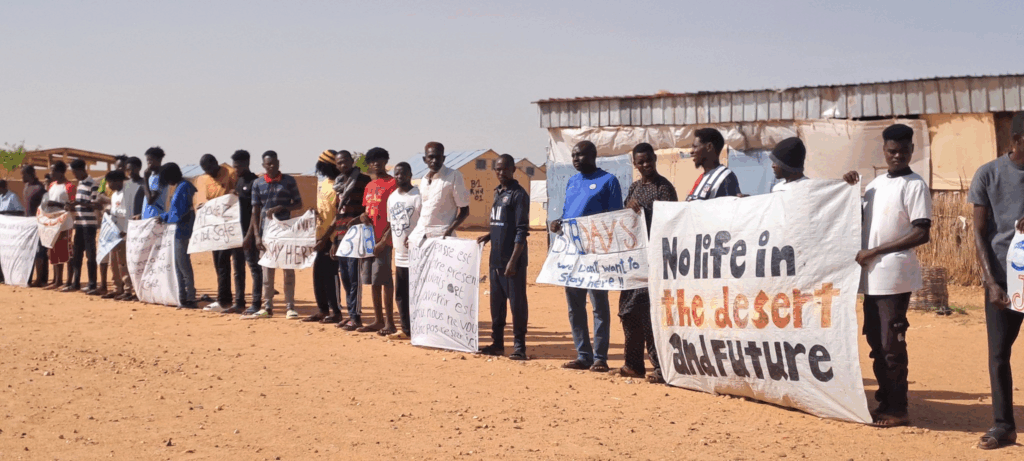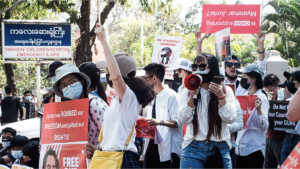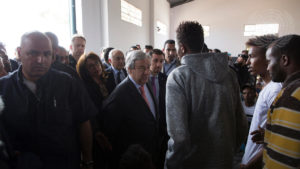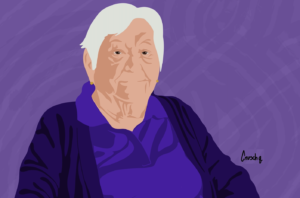
For over a year, refugees at the Humanitarian Centre near Agadez, Niger, have been protesting about their conditions of life and asking to be relocated elsewhere. Jeff Crisp, a volunteer with UAI, posed a number of questions to UNHCR about this situation, and received the following, unedited answers.
1. Please provide some details about the Humanitarian Centre near Agadez. When was it established, for what purpose, and who are the people living there?
The Centre was established in 2018 to provide a safe space where people could access shelter, protection, and humanitarian assistance while their claims for international protection were assessed. It is managed by Niger’s General Directorate for Civil Registry, Migration and Refugees (DGEC-MR), operating under the Ministry of Interior, with support and protection assistance provided by UNHCR and its national and international NGO partners. It hosts around 2,000 people as of early September 2025 – primarily from Sudan (along with others from West, Central, and the Horn of Africa).
2. What services and facilities are available to people living at the Humanitarian Centre in Agadez and which organizations are responsible for providing them?
Together with the authorities and partners, we continue to work to ensure that refugees and asylum-seekers at the Humanitarian Centre in Agadez have access to shelter, education, health services, water, sanitation, livelihood and protection support. Healthcare services are available to refugees and asylum-seekers through an integrated health centre in nearby Misrata, approximately seven kilometers from the Humanitarian Centre, which is supported by UNHCR.
Severe health cases are referred to the Agadez general hospital and transported with a dedicated ambulance provided by UNHCR. Emergency numbers of the Misrata integrated health centre available 24/7 have been regularly shared with the refugees and asylum-seekers at the Centre, especially those with chronic illnesses. In addition to dealing with emergency cases and referrals, the Misrata integrated health centre and UNHCR also organize rounds of vaccination and other health awareness raising sessions, directly at the Humanitarian Centre.
A primary school established by UNHCR within walking distance (700 metres) from the Humanitarian Centre is operational and transport is provided for older students to reach a secondary school in Agadez city. Bridge and language classes are offered to facilitate refugee integration into the Niger school system.
Food assistance has been provided since the Centre was established in 2018, initially in the form of hot meals and then food vouchers since 2024, to all residents at the Humanitarian Centre. From July 2025, in line with a longer-term plan to foster self-reliance but accelerated by the ongoing severe funding cuts, food assistance was reduced to cover only the most vulnerable refugees and asylum-seekers. Livelihood opportunities, such as vocational training and agricultural and livestock inputs, are available and have been strengthened.
Due to the ongoing financial crisis, UNHCR had to discontinue its partnerships with two NGOs in June, and is directly overseeing water provision, soap distribution, food voucher assistance, desludging and cleaning of latrines, as well as the maintenance, rehabilitation and construction of shelters.
While the situation is challenging, particularly amid shrinking humanitarian funding, UNHCR remains committed to ensuring that the basic rights and dignity of all refugees and asylum-seekers are safeguarded. We continue to advocate with donors for additional resources to maintain and further expand available services and opportunities.
3. What comments can UNHCR make about the longstanding protests by people at the Humanitarian Centre, who say that they do not want to live there anymore?
UNHCR acknowledges and understands the frustrations expressed by refugees and asylum-seekers in Agadez. Living conditions in the desert are harsh, and prolonged uncertainty about their futures adds to their distress. Since the establishment of the Centre, UNHCR has held weekly listening sessions with refugees and asylum-seekers. High-level discussions took place in December 2024 with Nigerien authorities and senior UNHCR officials to explore solutions.
In February 2025, the UNHCR Representative and Niger’s Ministry of Interior DG visited Agadez, but refugees declined to meet them. In May 2025, the Governor of Agadez and the Sultan encouraged refugees to use opportunities at the Centre and respect national laws. In June 2025, the Acting UNHCR Representative met the refugees, acknowledged funding challenges, and reaffirmed UNHCR’s commitment to dialogue and solutions, contingent on donor support.
It is however important to stress that the Humanitarian Centre is an open facility. Residents are free to move across Niger. Protestors are asking to be resettled to a third country. Unfortunately, resettlement opportunities globally are extremely limited. Fewer than 1 percent of the world’s refugees are resettled each year, and the available places are reserved for the most vulnerable cases, based on criteria established by resettlement countries. While UNHCR continues to advocate with governments to expand resettlement programmes, the demand far exceeds the supply of available places.
4. Some of the people at the Humanitarian Centre have been subject to arrest, detention and the withdrawal of their refugee status. Why have these taken place and what role has UNHCR played in them?
UNHCR has consistently affirmed that refugees and asylum-seekers have the right to peacefully express their concerns and to raise issues about their living conditions. As is the case for refugees worldwide, they are expected to respect the laws and regulations of the country of asylum. When UNHCR received information regarding arrests, detention, or decisions to withdraw refugee status or terminate the asylum process, we engaged the relevant authorities, including at both central and regional levels, to obtain further clarity, advocate for due process, and remind counterparts of their international obligations. In some cases, these interventions have led to the release of individuals.
In parallel, UNHCR has been working with national counterparts and legal partners to explore available remedies for those affected. We continue to underline the importance of procedural fairness, the safeguarding of dignity, and respect for rights throughout all processes. UNHCR recalls, in particular, the binding nature of the principle of non-refoulement and continues to advocate for the protection of individuals at risk, including by providing legal support and technical guidance on appeal procedures and other safeguards. Our role is to safeguard the rights and dignity of refugees and ensure that state actions remain consistent with international protection standards. We remain committed to constructive dialogue with refugees, authorities, and other partners to prevent further tensions, promote peaceful solutions, and ensure that those affected are treated fairly, with dignity, and in line with applicable legal frameworks.
5. UNHCR will be commenting on the recent arrest of six refugees at the Humanitarian Centre?
UNHCR is aware of, and is deeply concerned about, the situation involving the individuals whose refugee status was revoked, or whose asylum processes were interrupted, by the Nigerien authorities and who were subsequently apprehended at the Agadez Humanitarian Centre on 21 August 2025. UNHCR was not formally notified in advance and was not present when the arrests took place. Information was received only subsequently, on 22 August, through its governmental partner, the Commission Nationale d’Éligibilité (CNE).
Since then, UNHCR has been actively engaging with the Nigerien authorities, and has consistently advocated that any alleged violation of national laws and regulations should be dealt with by the ordinary judicial system applicable to both nationals and refugees, with full respect of procedural fairness and the need to safeguard the dignity and rights of all those concerned. UNHCR is aware that some of the individuals have minor children who remain at the Humanitarian Centre. We are deeply concerned by this separation, and we are calling for urgent and coordinated action by relevant authorities and partners to ensure the children’s protection, security, and well-being in line with the best interest principle. UNHCR has raised its concerns with the Nigerien authorities and has been recalling the binding nature of the principle of non-refoulement and the procedural standards necessary for expulsion.
6. Please explain the circumstances that have led to a withdrawal of food aid for many of the people at the Humanitarian Centre. What other livelihood opportunities are available to them, and has UNHCR undertaken a feasibility study of their ability to survive without such aid?
Since the Centre’s establishment in 2018 until mid-2025, food assistance was provided to all residents. Initially, this was delivered as hot meals, and since 2024 through food vouchers, enabling people to purchase and prepare their own food. However, the global funding crisis has severely impacted humanitarian operations in Niger, including those in Agadez. With donor contributions declining every year, UNHCR and partners are prioritizing assistance to the most vulnerable people with specific needs. Since July 2025, food assistance has therefore been limited to the most vulnerable groups—such as unaccompanied children, people with disabilities, older people, caregivers with multiple dependents, and those with serious medical conditions. Around 270 residents have been identified for continued assistance, with regular monthly assessments.
At the same time, UNHCR and partners have scaled up livelihood opportunities to help refugees and asylum-seekers build self-reliance. These include vocational skills training, support for small businesses, and agricultural and livelihood activities adapted to the Sahel environment. All programming is informed by assessments of feasibility and consultations with refugees themselves to ensure that opportunities are realistic, culturally appropriate, and accessible.
Available opportunities favoring self-sufficiency for refugees at the Humanitarian Centre include, among others: agricultural training through the Agadez University and access to 10 hectares of arable irrigated land, secured with the support of local authorities. 200 vocational training slots offered by the Agadez Municipal Youth Council (CCJ), against an initial 40 places.
This opportunity is still available, but despite information campaigns, a limited number of candidates has shown interest to register so far. Livelihoods support for 150 people, including both refugees and members of the host community, provided by UNHCR’s partner COOPI business starter kits, support for individual and group income-generating activities, as well as livestock kits from UNHCR.
7. What solutions are available to the people at the Humanitarian Centre, and what support is UNHCR providing to them in that respect?
The most immediate and realistic solution is greater inclusion in Niger’s national systems – schools, health services, and the local economy, where possible. This option provides continuity and stability, particularly for children, while contributing to peaceful coexistence with host communities.
Resettlement to third countries is currently not an available solution due to the extremely limited number of resettlement places offered by States worldwide. While UNHCR fully respects refugees’ decisions and is committed to ensuring the voluntariness, safety and dignity of returns, voluntary return is also not a viable solution at the moment for most refugees currently at the Centre, due to the ongoing conditions in their countries of origin and risks they would face.
Self-reliance and inclusion are therefore central to UNHCR’s current strategy. We are investing in vocational training, livelihood activities, and education to equip refugees with the skills and tools. In addition, we are working closely with the Nigerien authorities, donors, and development actors to expand opportunities and create a more favourable environment for integration and durable solutions.
8. UNHCR has recently appointed a new Representative to Niger. Are we now likely to see any changes in the organization’s country programme, and, more specifically, in the management of the Humanitarian Centre?
The overall direction of UNHCR in Niger remains consistent, with an emphasis on inclusion and sustainability, set against a backdrop of persistent financial constraints that continue to shape operational priorities. While we continue to advocate for more support for people forced to flee, UNHCR will keep working to ensure that international protection standards are upheld, and will facilitate the integration of refugees into national and local programmes and services. This includes the Humanitarian Centre in Agadez, where the vision is its gradual integration into the urban fabric of the city. This includes ensuring access to basic infrastructure and services aligned to required standards. UNHCR will continue to work with the authorities, refugee and host communities to ensure that this transition is gradual, orderly and responsive to community needs. Individual refugee cases will also continue to be carefully assessed to determine the most appropriate solutions, always within the existing legal and administrative frameworks, ensuring that responses remain both dignified and durable.











